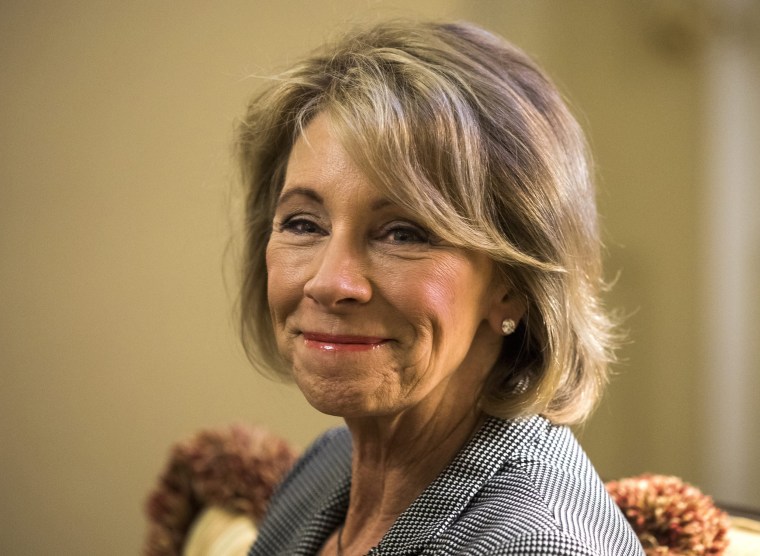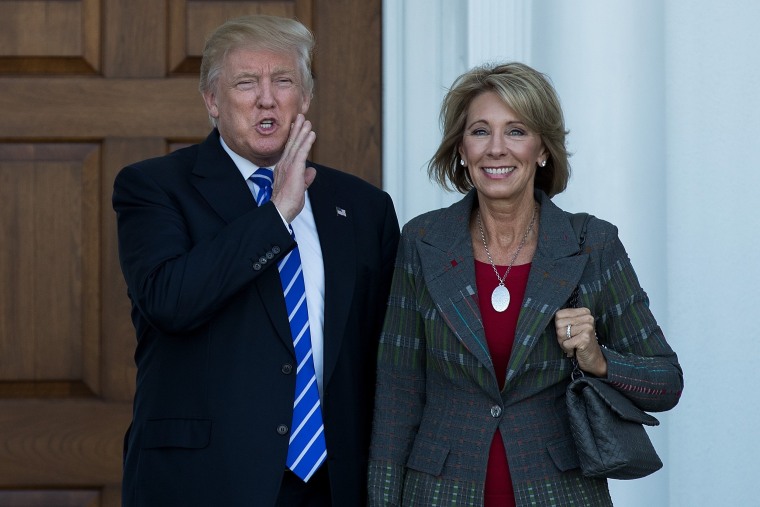Betsy DeVos, President-elect Donald Trump's pick to lead the Department of Education, has spent millions of dollars and decades of her life advocating for school choice, putting her at odds with longtime champions of public education.
It's a history that made her a natural fit for Trump's cabinet, but her record is likely to come under fire when confronted by Democratic heavy-hitters during her Senate confirmation hearing Tuesday evening.
“When Betsy DeVos appears before the Health, Education, Labor and Pensions Committee, I will have some important questions for her and for the members of our committee who will vote on her nomination," said Democratic Sen. Chris Murphy of Connecticut in a statement shortly after Trump's nomination of DeVos. "I want to know how Congress would put someone who has spent her life trying to strip funding from public schools in charge of those very schools."
As education secretary, DeVos would lead the agency responsible for policies affecting public schools. She would also be in charge of executing Trump's campaign promise to use $20 billion in federal funds to create school choice programs much like the ones she has championed in her home state of Michigan.
"We know that millions of children, mostly low-income and minority children, remain trapped in K-12 schools that are not meeting their needs," DeVos said in September shortly after Trump released his education plan. "We applaud the Trump campaign's focus on school choice and laying out common-sense proposals to help all children access a quality education."

But since Trump announced her nomination in November, Democrats and educational groups have voiced strong opposition to the billionaire businesswoman and longtime Republican donor — not just for her vast financial entanglements and potential conflicts of interest, but for having little experience in the field. DeVos previously referred to public education as a "dead end."
“There is no precedent for an Education Department Secretary nominee with your lack of experience in public education,” said Dem. Sen Elizabeth Warren of Massachusetts in a letter to DeVos earlier this month. Warren, a member of the committee that will conduct DeVos' confirmation hearing on Tuesday, added that the prospective education secretary had "virtually no experience" overseeing student loans, developing regulations to assure school accountability or improving education outcomes.
"[Y]our testimony before the Senate Committee on Health, Education, Labor, and Pensions will be critical to assessing your readiness for the position," said Warren.
Under Trump and DeVos, the education system could look very different — though the programs they've championed have long been favored by conservatives. Here's what to know ahead of DeVos' hearing.
What 'School Choice' Means
DeVos has long supported school choice programs through her nonprofit, American Federation for Children, and Trump has backed both school choice and voucher programs on the campaign trail. Both ideas would require the government to pay for students to attend private schools and charter schools, which are public schools run by private organizations.
Supporters say such programs would force schools to be competitive, fostering an environment that would create educational innovation as well as offer parents more choices when it comes to their children's education.

"The answer isn't bigger government. The answer is local control. It's listening to parents, and it's giving more choices," she said at a Trump rally in December, the only public statement she has made about her potential role in his administration.
Detractors don't buy that argument, however, saying that the programs would only pull resources from struggling public schools, keep costs the same — if not increase them — and stifle diversity.
Related: Obama and His Movement Prepare to Challenge President Trump
DeVos is expected to champion new voucher and school choice programs as education secretary, but may also seek to reduce government oversight of the schools they apply to.
That, at least, appears to have been the case in Michigan, where DeVos and her husband helped get the state's charter school law passed in 1993. When lawmakers there were considering a measure that would have added oversight for charter schools in Detroit last year, members of the DeVos family reportedly poured $1.45 million into legislators' campaign coffers, according to Chalkbeat, a nonprofit education news outlet. The final version of the bill no longer included oversight.
Many Republicans have praised Trump's nominee, as well as the programs she advocates.
“I have known her for many years; she is smart, dynamic, no nonsense and committed,” wrote Mitt Romney, the former Massachusetts governor, in an op-ed endorsing DeVos. “That’s why the education establishment is so animated to stop her.”
Former Florida Governor Jeb Bush posted a statement on Facebook not long after Trump announced his pick, saying he looked forward to her "bold leadership." DeVos and Bush pushed for school choice policies in his state, and DeVos' family foundation contributed to Bush's 2016 presidential campaign.
"She has a long and distinguished history championing the right of all parents to choose schools that best ensure their children’s success," Bush said.
Michigan as a Model
In her home state, DeVos used her considerable wealth — she is the daughter-in-law of Amway cofounder Richard DeVos, who Forbes estimates is worth $5.1 billion — to fund her views and initiatives through political donations. Her influence is likely to come up during her hearing, as Michigan charter schools have performed below the national average for the last eight years.
An external review of Michigan charter schools in 2015 found that "an unreasonably high" number were among the worst performing public schools in the state. Eighty percent of charter school students are below the state average for reading achievement, and 84 percent are below the state average for math, according to an assessment by the nonprofit Education Trust—Midwest.
Nevertheless, the number of charter schools in Michigan has continued to grow.
DeVos' programs would also potentially offer students the means to attend private schools, which could prove problematic because multiple states prohibit using public funds on schools with religious affiliations. A federalized voucher program, as proposed by Trump, would usurp that state control. According to the National Education Association, about 85 percent of private schools are religious.
Among DeVos' critics is Rev. Barry Lynn, executive director of Americans United for Separation of Church and State, who issued a statement following her nomination calling it an "insult to public education."
“Private school vouchers violate the fundamental principle of religious freedom because they fund religious education with taxpayer dollars," said Lynn. "This is indeed a dark day for public education in America.”
From a teacher retention standpoint, there's some cause for concern, as well. The NEA reports that nearly a quarter of teachers in small private schools tend to leave after a year. Almost 90 percent of public school teachers tend to stick to their positions.

Critics are also worried about what a voucher program might really mean for minority students, as they believe it could allow for veiled forms of segregation.
"Vouchers take critical resources away from our neighborhood public schools, the very schools that are attended by the vast majority of African American students," the NAACP said in its list of 2015-16 legislative goals. "Furthermore, private and parochial schools are not required to observe federal nondiscrimination laws even if they receive federal funds through voucher programs."
Ethics Paperwork and Financial Disclosures
After meeting with DeVos in early January, Senator Patty Murray, D-Washington, ranking member of the committee conducting DeVos' hearing, Murray released a statement saying that none of her initial concerns surrounding Trump's pick had been alleviated.
“I continue to have serious concerns about her long record of working to privatize and defund public education, expand taxpayer-funded private school vouchers, and block accountability for charter schools, including for-profit charter schools. I also continue to have concerns about her extensive financial entanglements and potential conflicts of interest and I hope that more information and transparency on this front is forthcoming,” Murray said, who later sent a letter to the Office of Government Ethics seeking an update on the status of DeVos' paperwork.
Trump's transition team said Tuesday morning that her paperwork, a certified ethics agreement and financial disclosure statement which would disclose any conflicts of interest she might have if she is confirmed, was submitted in December. However, the OGE has yet to clear her.
Politico reported Tuesday that Murray has formally requested additional financial disclosures, and that she plans to question DeVos' complex finances during the hearing. A spokesperson for Sen. Lamar Alexander,R-Tennessee, the committee chair, told Politico that he had no concerns about DeVos' paperwork.
One concern Democrats have raised, however, is the millions of dollars in fines DeVos' political action committee owed for violating Ohio campaign finance laws. A coalition of Democratic senators suggested last month that they might oppose DeVos' nomination unless she pays the $5.3 million in fines and fees dating back to 2008, when her All Children Matter PAC was cited for contributing $860,000 more than the legal limit to an affiliate in Ohio.
